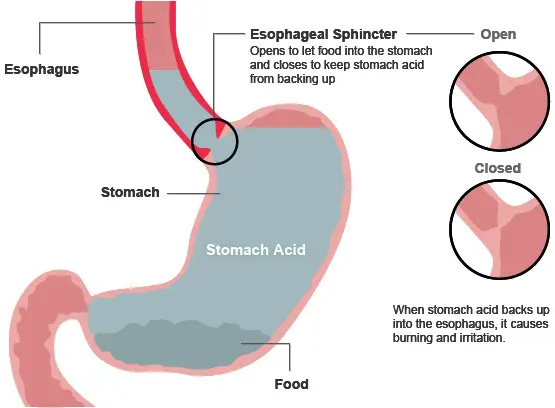Heartburn is an uncomfortable burning type sensation felt in the mid upper abdomen, which often radiates up into the chest and throat. Heartburn is the most common symptom of a condition called GERD (gastroesophageal reflux disease). According to the American Gastroenterological Association, heartburn occurs when acid or other stomach contents back up into the esophagus. Occasional heartburn isn’t considered dangerous, but chronic heartburn can lead to serious issues and should be evaluated by a gastroenterologist.
What causes Heartburn?
We have a muscle called the lower esophageal sphincter (LES), which is located at the GE junction where the esophagus and stomach meet. One of the functions of the LES is to keep stomach acid in the stomach. If the LES does not close tight enough or relaxes too much, it can allow stomach acid to reflux into the esophagus. This reflux is what causes the burning sensation in one’s chest. If someone has recurrent reflux of stomach contents into their esophagus, the condition is called gastroesophageal reflux disease (GERD).

What does Heartburn or GERD feel like?
Typically heartburn feels like some level of discomfort in the upper abdomen and chest area. However, it’s not unusual for the chest discomfort to be coupled with other symptoms like:
- A burning sensation in the throat
- Sour or bitter taste in the mouth
- Difficulty swallowing
- Coughing
- Wheezing
It’s important to note that the symptoms of heartburn/GERD are not necessarily the same for everyone. If heartburn becomes persistent, damage can be occurring in the esophagus which can lead to increased pain, GI bleeding, and even Barrett’s esophagus (a condition which can increase the risk for esophageal cancer). If heartburn symptoms become frequent or severe, you should see a gastroenterologist who can treat the condition and determine if an upper endoscopy is necessary to further evaluate the symptoms.
How does a Gastroenterologist evaluate Heartburn / GERD symptoms?
The best way to evaluate the esophagus for any damage from reflux disease is to perform an EGD or upper endoscopy. By performing an endoscopy, your gastroenterologist can directly visualize the esophageal mucosa and take biopsies if necessary to determine if changes consistent with esophagitis or Barrett’s esophagus are present.
If the diagnosis remains in question, a Bravo capsule study can be performed. A Bravo capsule study is an esophageal pH study in which a small capsule device is attached to the lower esophagus and sends pH readings to a recorder worn on a belt. This study can determine the whether or not a patient is experiencing a significant amount of acid reflux during the recorded period.
How do I improve my Heartburn symptoms?
Lifestyle and diet modifications are the best initial step in improving heartburn related symptoms. People who are experiencing acid reflux symptoms should eat smaller more frequent meals (avoid overeating), stop eating at least three hours prior to going to bed, elevate the head of their bed 4 to 6 inches, lose weight (if overweight), and stop smoking.
In regards to diet, care should be taken to avoid tomato based products, citrus products (ie. orange juice, lemonade, limeade, etc), chocolate, fried fatty foods, carbonated beverages, alcohol, and coffee.
People who experience infrequent symptoms can often take an over the counter H2 blocker like ranitidine or famotidine when the symptoms arise. People with more chronic reflux issues and symptoms more than 2 -3 times per week (that are not relieved with lifestyle modification) will likely benefit from Proton pump inhibitor therapy (ie. Omeprazole, lansoprazole, esomeprazole, etc.). Anyone who has been on acid reducing medications for a prolonged period of time or who has persistent symptoms, should be evaluated by a gastroenterologist to determine if further evaluation is necessary.
Disclaimer: The information presented on this website is not intended to take the place of your personal physician’s advice and is not intended to diagnose, treat, cure or prevent any disease. Discuss this information with your healthcare provider to determine what is right for you. All information is intended for your general knowledge only and is not a substitute for medical advice or treatment for specific medical condition
